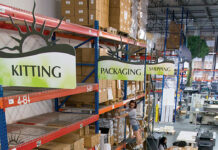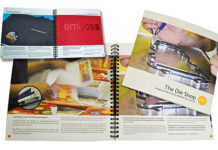by Jen Clark, The Binding Edge

Tom Alvis always knew he wanted to be a business owner, but little did he know the opportunity would come knocking. Alvis, a long-time employee of Seattle Bindery, a Seattle, WA, postpress house specializing in custom tabs and presentation folders; folding and stitching; foil stamping, embossing and diecutting; plastic spiral, Wire-O®; perfect binding; and film laminating, recently purchased the trade bindery from Milt Vine, the longtime owner who had decided the time was right for retirement.
Vine approached Alvis with the idea in 2011, but “things didn’t really get going until November 2012. We closed in August 2013, so it was a fairly long timeline,” Alvis explained, noting Vine told him he was ready for another challenge. “He said he was still young enough to do something else. He had done this for 20 years. He was ready to close this chapter and move on. By the time the sale closed, he was ready for some time off. I don’t think he’s made any official decisions yet, but I do think he is enjoying retirement.”
While surprised at the offer, Alvis jumped at the chance to write the next chapter in Seattle Bindery’s 50-plus year history. “I had held many different positions with Seattle Bindery over the years; and when Milt approached me about purchasing the business, it caught me a little off guard,” he recalled. “I discussed the proposal with my wife, and we decided it would be a good move at this time.”
Over the last seven or eight years, Alvis and his wife, Janice, had been contemplating the purchase of a small business. They had their eyes on a typical franchise-type restaurant or something similar, though. “There was a smaller bindery that I had looked at a few years ago, but we decided that wasn’t feasible,” he said. “At the time, I had mentioned to Milt what was going on, and he off-handedly asked if I’d be interested in buying Seattle Bindery. At that point, it wasn’t feasible, which is why I was so surprised when he approached me again,” Alvis explained. “I didn’t think it would be financially feasible (this time), but we investigated, and we were able to reach a deal. We managed to get it all financed and made it happen.”
Looking back, Alvis said it made sense to purchase Seattle Bindery. “What better business to own than the one I had worked at for most of the last 25 years?” Alvis started his career there in 1990, but left a decade later. After a short stint with Safeco Insurance Company, he returned to Seattle Bindery in 2004. The economic downturn had an impact on the company, “and profits were not what they used to be, but the company was profitable,” Alvis said. “I felt that the timing was right, and that it was a good time to buy. I am counting on a recovering economy and my knowledge of both Seattle Bindery and the industry to keep the company on track and achieve success in the future.”
Even though the economy hasn’t completely bounced back, Alvis started seeing some improvement beginning in 2011. “Some of that was through a better economy and some through attrition of the competition,” he said. “I see the market staying flat in the short term and am hopeful for small growth once the economy starts moving.”
A look back
Founded in 1960, the company was first known as Seattle Litho Bindery. Ed Wood spent 30 years at the helm before selling the operation in 1991 to Vine, who had previously worked as a certified public accountant. “When Milt bought the company, it was known as Seattle Bindery and Mailing and was located in the south Lake Union area of Seattle,” Alvis said. “The company did traditional bindery work, along with mailing. At that time, folding and stitching were the main revenue producers, and the company had about 20 employees.”
For a little more than a decade, the company enjoyed steady growth and twice expanded its capabilities with the purchase of Ad Products in 1994 and Blake Letterpress in 1997. The first acquisition added custom index tabs and mechanical binding to the company’s capabilities, while the latter gave the company a full complement of postpress services, though it no longer handled mailing. To accommodate the update in services, the company changed its name to Seattle Bindery. In 1999, Seattle Bindery moved to its current location in Tukwila and grew to employ about 40 people. In 2004, the company added film laminating to its list of offerings.
After two recessions, Seattle Bindery had downsized to less than 20 employees when Alvis purchased the company in August of last year. As part of the sale, the company was renamed to Seattle Bindery & Finishing and has added four new full-time employees. “I have spent the first few months tweaking things and trying to improve the bottom line with a series of small changes,” he said. “We are always looking to add new services, equipment and employees, but each decision is based on value.” Alvis said he hasn’t made any major changes to the way the bindery operates. As for the employees, he said their reaction has been positive. “I’ve worked here for most of the last 25 years, so everyone pretty much knew me. We have a lot of long-time employees. I have a lot of friends who work for me, which is different, but so far, so good.”
Never a dull moment
Now that he’s the owner, Alvis’ work varies from day-to-day. He manages the company’s finishing operations – diecutting, foil stamping and folding/gluing. He also provides customer service for difficult or special projects and has administrative responsibilities. “I help out where needed,” he said. “My days never seem to turn out how I plan.”
Making the transition from employee to owner has been interesting, he said. A transition period helped Alvis ease into the role of owner. “Milt was on-site every day for 30 days. Then on an as-needed basis for another 30, and hes still available to me now,” Alvis explained. “Every now and then, I send him an email for something I need to know. As the days go by, that’s happening less and less.”
Since it took a little more than a year for the deal to finalize, Alvis said that gave him time to let everything sink in. “It’s a different set of challenges for sure,” he said. “A lot of day-to-day stuff hasn’t changed that much. Some is easier to do now, but it is difficult to find time to go out and do anything in the shop. But, I have run most of the equipment at one time or another, so occasionally I need to help out there. Other days, I may have to run out to visit a customer and consult on a complex job. And, unfortunately, some days are spent dealing with breakdowns or problem jobs.”
Despite having a financial stake in the business, Alvis said his wife has remained hands-off. “Her job is to be the bread-winner,” he joked. “She has a good job outside the industry. We’ve talked about her coming to work here. Eventually, it may happen.”
Alvis noted he finds the customer service angle much easier now that he’s in charge. “I’ve always enjoyed the customer service part of the job,” he said. “Getting to discuss projects and determining how we can help the customer out is very rewarding. It’s a situation where we can be creative to make things work. If we do a good job on something, the customer’s happy and their customer is happy too. There are good days and there are bad days. Sometimes people aren’t happy with you,” he said. “But, hopefully there are more good days than bad.”
Customer response to the change in ownership has been positive, too. “I’ve tracked the customer base,” Alvis said. “All of our customers are sticking with us; we’ve had a few that have wanted to review and renew their contracts – for the most part, that’s been positive. Doors are opening. That’s an area where things have improved a little bit. Sometimes customers see that things are changing and it gives them a chance to review things.”
Trends shape business

Alvis said Seattle Bindery & Finishing serves the greater Seattle area and has customers throughout Washington State. “But we don’t have a typical job,” he noted. “Our biggest niche is that we do more under one roof than our competitors.” As an example, Alvis described a project that might entail 1,500 plastic coil books that consist of 92 pages and five Mylar index tabs that require foil-stamped front covers and a back covers with a glue-folded pocket. And customers are expecting their projects completed faster than ever. “Thats the main trend I see,” he said. “Fast turnaround time; more and more digital printing and short-run jobs. This has been the trend for the last decade. We actually downsized our perfect binding so we could be competitive on short-run jobs and decided to get out of the large-run market.”

Alvis said people are willing to spend money on print because they want a great or unusual look. “Our bindery can be a big part of that. Customers want less bulk mailers and more “designer” brochures, business cards or presentation folders. We have responded to this over the years by adding many services, such as eyeleting, which can be used to achieve an “industrial” look,” he said. “That has turned out to be a great little machine. Some customers use them as decoration rather than functionality. We’ve done jobs for people where they’ll put an eyelet on a business card just for the industrial look.”
At this point, Alvis hasn’t added any new services to the shop. The decision to add anything new will depend on customer feedback, he said. Current bindery services include folding, presentation folder gluing, stitching, trimming, rotary perforation and scoring, gathering and collating, perfect binding, Wire-O, plastic spiral, transfer tap, drilling, round cornering, shrink wrapping, eyeleting, film laminating and UV coating. Its tabbing operation includes custom index tabs, copier tabs, tab reinforcing, spine reinforcing, patch edge reinforcing and five-hole drilling. Finishing capabilities include autoplaten diecutting, diecutting up to 41″, scoring and perforating; embossing, foiling and numbering.
Focused on the future
With a renewed energy, Alvis and his staff are working out of the same 30,000 square foot building Vine leased and relocated the company to in 1999. At the time, Vine reported the new space provided “an open work area” that allowed “production managers … to see the entire floor.” The move allowed Seattle Bindery to finish jobs more quickly, which helped customer service. It also provided room to grow.
Seattle Bindery & Finishing’s equipment includes a Heidelberg Quickbinder, two Scott 10000 tabbers, a Bobst autoplaten diecutter, three MBO folders, two McCain stitchers, a Kluge Omni folder/gluer, three Heidelberg cylinder letterpresses, three Heidelberg platen letterpresses, a 20×28″ platen foil press, a Kluge EHD foil/diecut platen press, a Stahl pharmaceutical folder and two cutters. The company also operates both single- and double-sided film laminating machines. “A new piece of equipment that I have my eye on is rather expensive,” he said. “Every now and then a rebuilt one comes on the market. Theyre still not cheap, but are more affordable. Thats what were saving for… so when it comes along we can jump on it. Hopefully I’ll have it sooner rather than later.” While he declined to name what equipment hed like to purchase, he did say “it would allow us to offer another “unique” service.”
Alvis has another area he’d like to see Seattle Bindery & Finishing expand into, although he considers it more of a “long-term” project. “I’d like to explore more packaging work, such as paperboard cartons,” he said. “That would mean adding a straight-line gluer to our operation.”
In the meantime, Alvis said he’s focusing on the task at hand – making Seattle Bindery & Finishing a success. “We are currently negotiating a new seven-year lease, so we plan on being around and doing trade bindery in this region for a long time,” he said. “We are working on improving what we already do in the short-term. We want it to be easy for our customers to do business with us.”




